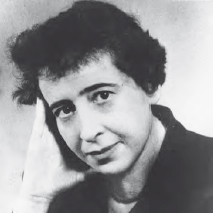Continental PhilosophyCritical Theorists |
Who was Hannah Arendt? |
Hannah Arendt (1906–1975) was a German-American social and political philosopher, who taught at The New School after World War II. She attended the University of Marburg, where she began the affair with Martin Heidegger (1889–1976) that was to become a lifelong relationship. They broke up and came together repeatedly. Arendt wrote her dissertation on Saint Augustine with Karl Jaspers (1883–1969) at Heidelberg University. She was married to the philosopher Günther Anders (1902–1992) in 1929, but they divorced in 1937. She was not allowed to continue her habilitation because she was a Jew; after beginning an investigation on anti-Semitism, she was questioned by the Gestapo. She then went to France, and worked with Walter Benjamin (1892–1940) in helping Jewish refugees. Her own imprisonment at Camp Gurs ended with her escape.
In 1940 Arendt married Heinrich Blücher (1899–1970), a poet, philosopher, and former Communist. With Blücher and her mother, she escaped to the United States from Vichy, France on phony visas (with the assistance of Hiram Bingham IV, an American diplomat). After World War II, Arendt testified for Heidegger in a de-Nazification hearing, and she wrote an admiring essay about his work in a philosophical celebration of his eightieth birthday.
Arendt was director of research for the Commission of European Jewish Cultural Reconstruction, which led to frequent returns to Germany after 1944. In the United States she taught at the University of California at Berkeley, Princeton University, Northwestern University, and The New School. She was not particularly progressive in the American social context, supporting racial segregation at the beginning of the Civil Rights movement, and refusing to be identified as a feminist during the period of “women’s liberation.” Her main works are The Origins of Totalitarianism (1951), The Human Condition (1958), On Revolution (1963), On Violence (1970), Eichmann in Jerusalem (1963), and The Life of the Mind (1978).

